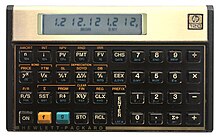
Summary
A financial calculator or business calculator is an electronic calculator that performs financial functions commonly needed in business and commerce communities[1] (simple interest, compound interest, cash flow, amortization, conversion, cost/sell/margin, etc.). It has standalone keys for many financial calculations and functions, making such calculations more direct than on standard calculators.[2] It may be user programmable, allowing the user to add functions that the manufacturer has not provided by default.[3]


Examples of financial calculators are the HP 12C, HP-10B and the TI BA II.[4]
A wide number of graphing calculators, like the Casio FX-9860GII, the Texas Instruments TI-89 Titanium, and the Hewlett Packard HP 48gII include complex financial calculations, as do spreadsheet applications such as Microsoft Excel, LibreOffice Calc, and Google Sheets.
References edit
- ^ Hall, Pamela L. (1999), Effective Use of a Financial Calculator, Cengage Learning, ISBN 9780030267864
- ^ Gitman, Lawrence; Joehnk, Michael; Billingsley, Randy (2013), "Appendix E: Using a Financial Calculator", Personal Financial Planning (13th ed.), Cengage Learning, pp. 620–621, ISBN 9781285633138.
- ^ Barrell, Doris (2004), Real Estate Finance Today, Dearborn Real Estate, p. 34, ISBN 9780793181490,
most real estate professionals today use a programmable financial calculator to determine loan payments and other financial calculations
. - ^ Marx, Johan (2009), Using Financial Calculators for Time Value of Money Calculations, Pearson South Africa, ISBN 9781770256804,
This booklet explains how to use 2 different financial calculators ... namely the Hewlett-Packard 10-BII [and] Texas Instrument BA II plus
.


